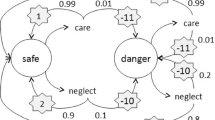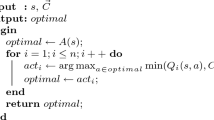Abstract
This paper proposes an approach to investigate norm-governed learning agents which combines a logic-based formalism with an equation-based counterpart. This dual formalism enables us to describe the reasoning of such agents and their interactions using argumentation, and, at the same time, to capture systemic features using equations. The approach is applied to norm emergence and internalisation in systems of learning agents. The logical formalism is rooted into a probabilistic defeasible logic instantiating Dung’s argumentation framework. Rules of this logic are attached with probabilities to describe the agents’ minds and behaviours as well as uncertain environments. Then, the equation-based model for reinforcement learning, defined over this probability distribution, allows agents to adapt to their environment and self-organise.




Similar content being viewed by others
Notes
As we shall see in a moment, obj is used to denote those factual statements that are objectively true and so independent from the agents’ perspective.
References
Andrighetto G, Campennì M, Cecconi F, Conte R (2010) The complex loop of norm emergence: a simulation model. In: Simulating interacting agents and social phenomena. Springer, Berlin
Andrighetto G, Villatoro D, Conte R (2010) Norm internalization in artificial societies. AI Commun 23(4):325–339
Brooks L, Iba W, Sen S (2011) Modeling the emergence and convergence of norms. In: Walsh T (ed) IJCAI. IJCAI/AAAI, pp 97–102
Buşoniu L, Babuška R, De Schutter B (2008) A comprehensive survey of multi-agent reinforcement learning. IEEE Trans Syst Man Cybern Part C Appl Rev 38(2):156–172
Conte R, Falcone R, Sartor G (1999) Introduction: agents and norms: how to fill the gap? Artif Intell Law 7(1):1–15
Davidsson P (2000) Multi agent based simulation: beyond social simulation. In: Proceedings of MABS 2000. Springer, Berlin, pp 97–107
Davidsson P (2002) Agent based social simulation: a computer science view. J Artif Soc Soc Simul. http://www.soc.surrey.ac.uk/JASSS/5/1/7.html.
Dennett DC (1987) The intentional stance (Bradford Books). The MIT Press, Cambridge
Dung PM (1995) On the acceptability of arguments and its fundamental role in nonmonotonic reasoning, logic programming and n-person games. Artif Intell 77(2):321–358
Dung PM, Thang PM (2010) Towards (probabilistic) argumentation for jury-based dispute resolution. In: Baroni P, Cerutti F, Giacomin M, Simari GR (eds) COMMA, vol 216 of frontiers in artificial intelligence and applications. IOS Press, Amsterdam, pp 171–182
Governatori G, Rotolo A, Sartor G (2005) Temporalised normative positions in defeasible logic. In: Proceedings of the 10th international conference on artificial intelligence and law. ACM Press, New York, pp 25–34
Haenni R (2009) Probabilistic argumentation. J Appl Logic 7(2):155–176
Hunter A (2012) Some foundations for probabilistic abstract argumentation. In: Proceedings of the 4th international conference on computational models of argument (COMMA 2012)
Pitt J, Schaumeier J, Artikis A (2011) The axiomatisation of socio-economic principles for self-organising systems. IEEE international conference on self-adaptive and self-organizing systems, pp 138–147
Pollock JL (1995) Cognitive carpentry. MIT Press, Cambridge
Prakken H (2011) An abstract framework for argumentation with structured arguments. Argument Comput 1(2):93–124
Prakken H, Sartor G (1997) Argument-based extended logic programming with defeasible priorities. J Appl Non Class Logics 7(1):25–75
Riveret R, Rotolo A, Sartor G, Prakken H, Roth B (2007) Success chances in argument games: a probabilistic approach to legal disputes. In: Proceeding of the 2007 conference on legal knowledge and information systems: JURIX 2007: the twentieth annual conference, IOS Press, Amsterdam, pp 99–108
Riveret R, Prakken H, Rotolo A, Sartor G (2008) Heuristics in argumentation: a game theory investigation. In: COMMA, pp 324–335
Riveret R, Rotolo A, Sartor G (2012) Norms and learning in probabilistic logic-based agents. In: DEON 2012, Springer, Berlin
Roth B, Riveret R, Rotolo A, Governatori G (2007) Strategic argumentation: a game theoretical investigation. In: Proceedings of the 11th international conference on artificial intelligence and law, ICAIL’07, ACM, New York, NY, pp 81–90
Savarimuthu BTR, Cranefield S (2011) Norm creation, spreading and emergence: a survey of simulation models of norms in multi-agent systems. Multiag Grid Syst 7(1):21–54
Shoham Y, Powers R, Grenager T (2007) If multi-agent learning is the answer, what is the question? Artif Intell 171(7):365–377
Tuyls K, Nowe A (2005) Evolutionary game theory and multi-agent reinforcement learning. Knowl Eng Rev 20(01):63–90
Acknowledgments
This paper extends and revises some preliminary work of Riveret et al. (2012). We would like to thank the anonymous reviewers of DEON 2012 for their comments. Our gratitude goes to Giulia Andrighetto and Mario Paolucci for their valuable suggestions. Part of this work has been carried out in the scope of the EC co-funded project SMART (FP7-287583).
Author information
Authors and Affiliations
Corresponding author
Rights and permissions
About this article
Cite this article
Riveret, R., Rotolo, A. & Sartor, G. Probabilistic rule-based argumentation for norm-governed learning agents. Artif Intell Law 20, 383–420 (2012). https://doi.org/10.1007/s10506-012-9134-7
Published:
Issue Date:
DOI: https://doi.org/10.1007/s10506-012-9134-7




